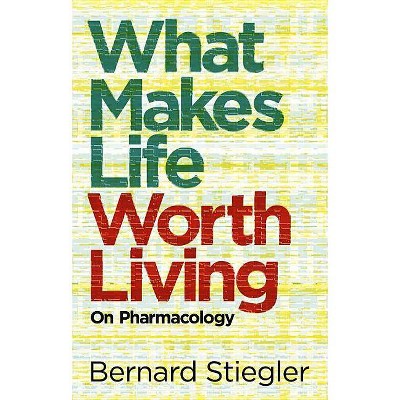What Makes Life Worth Living - by Bernard Stiegler (Paperback)

Product info
<p/><br></br><p><b> About the Book </b></p></br></br>The pharmakon, both cure and poison, refers to the technical objects through which we open ourselves to new futures, and thereby create the spirit that makes us human. From Socrates and Derrida to the child psychoanalyst Donald Winnicott, Stiegler shows that technics are both the cause of our suffering and also what makes life worth living.<p/><br></br><p><b> Book Synopsis </b></p></br></br>In the aftermath of the First World War, the poet Paul Valéry wrote of a 'crisis of spirit', brought about by the instrumentalization of knowledge and the destructive subordination of culture to profit. Recent events demonstrate all too clearly that that the stock of mind, or spirit, continues to fall. The economy is toxically organized around the pursuit of short-term gain, supported by an infantilizing, dumbed-down media. Advertising technologies make relentless demands on our attention, reducing us to idiotic beasts, no longer capable of living. Spiralling rates of mental illness show that the fragile life of the mind is at breaking point. <br /> <br /> Underlying these multiple symptoms is consumer capitalism, which systematically immiserates those whom it purports to liberate. Returning to Marx's theory, Stiegler argues that consumerism marks a new stage in the history of proletarianization. It is no longer just labour that is exploited, pushed below the limits of subsistence, but the desire that is characteristic of human spirit. <br /> <br /> The cure to this malaise is to be found in what Stiegler calls a 'pharmacology of the spirit'. Here, pharmacology has nothing to do with the chemical supplements developed by the pharmaceutical industry. The pharmakon, defined as both cure and poison, refers to the technical objects through which we open ourselves to new futures, and thereby create the spirit that makes us human. By reference to a range of figures, from Socrates, Simondon and Derrida to the child psychoanalyst Donald Winnicott, Stiegler shows that technics are both the cause of our suffering and also what makes life worth living.<p/><br></br><p><b> Review Quotes </b></p></br></br><br>Stiegler's title is bold, but make no mistake: this book really is about what makes life worth living. We can neglect this dimension - disastrously - or we can act to sustain it. A survival manual for the twenty-first century, this is also contemporary philosophy as a call to arms.<br /> <b>Martin Crowley, University of Cambridge</b> <br /> <br /> This work, an excellent primer on the latest phase of Stiegler's project and an excellent introduction to his writing, attempts to turn a thinking of the pharmakon from its resonance as poison to that of a cure to the pan-toxicity he finds in the robo-interiorities of the present and their link to eco-catastrophic outcomes. What this book also displays is that Stiegler has long been the most productive critical reader of Derrida's legacy today - and this at a time when anything like official 'deconstruction' gasps for relevance.'<br /> <b>Tom Cohen, State University of New York at Albany</b><br><p/><br></br><p><b> About the Author </b></p></br></br><b>Bernard Stiegler</b> is Director of Cultural Development at the Centre Pompidou in Paris. His many books in English include <i>Technics and Time</i>, <i>For a New Critique of Political Economy</i>, <i>The Decadence of Industrial Democracies</i> and <i>Uncontrollable Societies of Disaffected Individuals</i>.
Price History
Price Archive shows prices from various stores, lets you see history and find the cheapest. There is no actual sale on the website. For all support, inquiry and suggestion messagescommunication@pricearchive.us